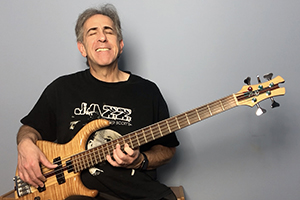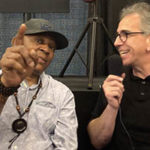A “drudgery-free” approach to learning bass and making music
By Jon Liebman
Week of January 11, 2021
What’s your attitude toward learning scales? When learning bass, or any instrument, it seems we’re always instructed to “Learn your scales; learn your modes.”
I’ve talked about the topic before, generally in the context of scales being a means to an end, with an eye toward learning to make music out of all those notes.
In this week’s interview with Danny Pritchett, creator of Dream Upright, we talked about taking the concept a step further. It was truly inspiring to hear insights from someone who views music as “so therapeutic and fun!”
“Scales are great,” Danny says. “I mean, they have all the different types of ways that you can get through the motions, all the different modes and stuff.”
If you know anything about my recommended approach to learning bass, you know I’m all about the groove. In all my books, lessons, and online instruction, I make everything groove.
Including scales.
Chances are you’ve spent some time going learning your scales and modes, “Ionian, Dorian, Phrygian…” There are lots more too. But don’t panic; it’s a good thing!
“You can find different ways to express yourself and kind of travel, in essence,” says Danny. “You can go to a Romanian scale. You can do the gypsy scale. You can do an Arabic scale, a Chinese scale.”
When you think of scales as a jumping off point, rather than a required chore all musicians must endure, it opens up your creativity and dramatically adds to your enjoyment of playing music.
“I love the versatility in scales,” Danny continues. “They can provide us with the colors. I would recommend finding as many colors and different ways of getting to different notes and scales as you can, mimicking your favorite songs.”
Remember, the ultimate goal is to make music. Learning your scales will provide a deeper understanding of music theory and help you build amazing bass technique. Most importantly, it will help you apply your newfound knowledge toward making great music.
If you want to learn bass, consider taking your approach to scales up a notch, looking for new ways explore the fingerboard. It’s a lot of fun, especially if you’re making it groove!
How about you? Have a thought on the subject? Leave a comment below and let me know what you think. In the meantime, check out my interview with Danny here.




